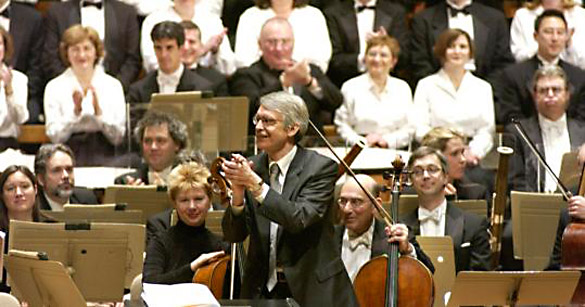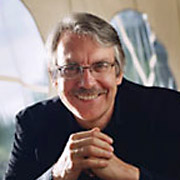The Boston Symphony Orchestra begins a two season cycle of the complete symphonies of John Harbison

John Harbison, who is among America's most distinguished artists,
is a composer, MIT Institute Professor, and Professor of Music
in MIT's School of Humanities, Arts, and Social Sciences.
Six symphony cycle will span two seasons
Beginning with performances of Symphony No. 3 on October 14-16, 2010, the Boston Symphony will perform the complete cycle of Harbison's symphonies, spanning two seasons. The cycle commences with Symphonies 3, 2, and 1 in 2010-11, and culminates the following season with the world premiere of Symphony No. 6, an in-progress work commissioned by the BSO (this is the eighth BSO commission for Harbison). The BSO calls the performance cycle "an unprecedented opportunity to experience these exciting, colorful, varied, and instantly appealing contributions to the modern symphonic literature."
Free tickets
Available for MIT students to attend Harbison's BSO concerts
Excerpt | Jeremy Eichler interview with John Harbison
The Boston Globe, 10 October 2010
On the eve of the first installment of the BSO’s survey, Harbison spoke with the Globe about his perspective on this imposing genre, about the inspiration he drew from earlier models, and about the creative block he first experienced — until his unconscious stepped up to save the day."
Q. It’s sometimes said that the genre of the symphony, like the great realist novel, culminated in the 19th century. How did you initially approach the idea of the symphony today?
A. See interview at The Boston Globe
Links
Details and Tickets | Boston Symphony Orchestra
Music Program | John Harbison, Institute Professor of Music
Complete list of Harbison works
Celebrating John Harbison
Video | John Harbison on MIT students
Video | John Harbison on Music and Art at MIT

About John Harbison
Composer John Harbison, MIT Institute Professor, and faculty member of the Music Program of the MIT School of Humanities, Arts, and Social Sciences, is among America's most distinguished artists. The recipient of numerous awards and honors (including the prestigious MacArthur Foundation's "genius" award and the Pulitzer Prize), Harbison has composed music for most of America's premiere musical institutions, including the Metropolitan Opera (The Great Gatsby, 1999), the Chicago Symphony, Boston Symphony, New York Philharmonic, and the Chamber Music Society of Lincoln Center. His works include four string quartets, five symphonies, a ballet, three operas, a cantata, and numerous chamber and choral works, more than ninety of which have been recorded on leading labels such as Harmonia Mundi, New World, Deutsche Grammophon, Albany, Centaur, and Naxos.
Recent major premieres include Leonard Stein Anagrams (PianoSpheres), Mary Lou (Pittsburgh Youth Symphony), and The Seven Ages (a Koussevitsky commission for the New York New Music Ensemble and the San Francisco Contemporary Music Players), French Horn Suite (Boston, MA), A Clear Midnight (Pro Arte Singers), Winter’s Tale (BMOP, complete revised version), Symphony No. 5 (Boston Symphony Orchestra), The Great Gatsby Suite (Aspen Festival Orchestra), Cortège (New England Conservatory), Milosz Songs (New York Philharmonic with soprano Dawn Upshaw), Concerto for Bass Viol (for fifteen major orchestras), But Mary Stood (Cantata Singers), and the sinfonietta Umbrian Landscape (Chicago Chamber Musicians). The 2009-10 season included premiere performances of a double concerto for violin and cello (Boston Symphony), and Diamond Watch, for two pianos (Boston), written in honor of Nobel laureate and Institute Professor, Peter Diamond. Harbison’s present composition projects include a setting of texts by Alice Munro for voice and orchestra (for the Metropolitan Opera Orchestra), his fifth string quartet (for the Pro Arte Quartet), and a work for violin and piano (Music Accord).
Mr. Harbison has been composer-in-residence with the Pittsburgh Symphony, the Los Angeles Philharmonic, the American Academy in Rome, and numerous festivals, including Tanglewood, Marlboro, and Aspen. He received degrees from Harvard and Princeton before joining the Massachusetts Institute of Technology, where he is currently Institute Professor, the highest academic distinction offered resident faculty. He is Acting Artistic Director of Emmanuel Music (Boston), co-Artistic Director of the Token Creek Chamber Music Festival, and has just completed a thirteen-year term as President of the Copland Fund. Harbison’s music is published exclusively by Associated Music Publishers. •
Photocredit: Stu Rosner / The Boston Globe